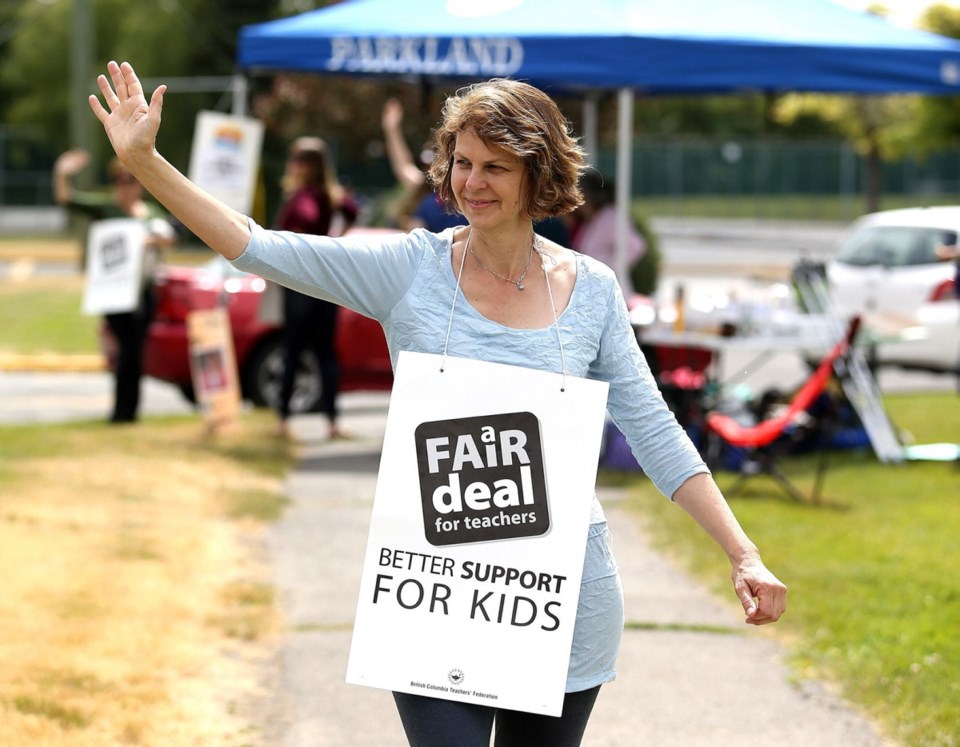This is not the way Ann McLean wanted to finish 20 years of teaching at Sidney’s Parkland Secondary.
She had hoped the days leading to her retirement would be a time of joy. Instead, Friday found her walking the picket line, pondering the decline of the school system that so impressed her when she emigrated from her native England a quarter-century ago.
“I’m very worried about the public education system,” she says. “It feels like it has all been taken away gradually.”
McLean became a teacher in England in the mid-1980s, but didn’t get a passion for the profession until an exchange brought her to Prince George a few years later.
B.C. was a revelation. Education was more valued here than in the U.K., the teachers more respected, better paid and given more resources. McLean caught on with the Prince George system, then moved to Parkland as a French teacher in 1994. She has been there ever since, enjoying its collegial family atmosphere.
“I love teaching,” she says. “I love my kids.”
That’s what makes the erosion hard to take. The school system has become like a house where repairs never get done, she says. “Things have been let go, let go, let go.…”
Economic pressures mean big classes; math and science teachers find themselves staring at more than 30 students — though numbers dwindle as kids, not getting the help they need to keep up, drift away.
Districts can’t afford to offer classes with low enrolment, so a small school like Parkland — just 640 students — has to limit its course selection. Next fall, the school will have a rare French 11/12 split class. The comparative civilization course that McLean used to teach will be cut. So will Geography 12.
The peripheral supports have disappeared. Resources from the Ministry of Children and Family Development have dwindled. The RCMP liaison officer’s role is being rejigged. A teacher who helps students with behavioural or learning difficulties has a caseload that works out to 20 minutes per kid per week.
The little things add up. Clerical help with typing and photocopying has vanished. Open-source software might save money, but it’s slow (the Internet froze during a critical moment as one of McLean’s students gave a presentation this week). A science teacher has begun turning to outside sources for grants to buy the materials necessary to conduct classroom experiments.
“It’s always ‘work smarter, do more with less,’ ” McLean says.
She’s no longer sure what to say to ex-students who ask about becoming teachers. “I love my job, but honestly, can I say to them that it’s a great career? I don’t know.”
The truth is, B.C. has far more teachers than teaching positions. The province’s post-secondary institutions keep churning out 1,800 education grads a year to fill an average of just 900 vacancies. In fact, 3,000 teaching certificates were issued in B.C. last year; that’s a combination of new teachers and those flowing in from elsewhere.
B.C. teaching credentials are valued elsewhere. Ben Glickman, the CEO of Vancouver’s Footprints Recruiting, spent Wednesday trolling the picket line for teachers — particularly those of science, IT, or math — willing to move to private schools in China. “In some cases, the pay is comparable or better,” he says. “These aren’t just backpacker jobs anymore.”
Still, Glickman says he gets more interest from laid-off U.S. teachers than from educators here. Glut or not, few want to leave B.C. That doesn’t help the union’s bargaining position.
McLean is leaving, though, moving to France on July 1. She hates retiring under these circumstances. She usually cooks a French dinner in her home for her graduating Grade 12s, but the strike scuttled those plans. “The kids haven’t asked for this. I don’t feel they should be suffering for political reasons.”
But someone has to fight the decline, she says. “The teachers don’t believe that the government believes in public education.”
The strike will eventually end, one way or another, but will the constant cuts?
That’s the real question for Ann McLean as she leaves the career, kids, school and country she has grown to love.



